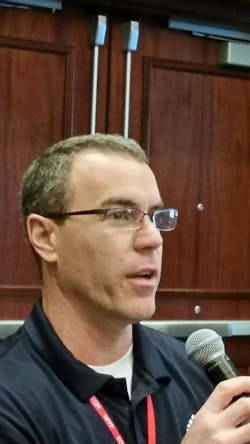Firefighters' Survivors Share Stories at NFFF Conference
WASHINGTON, D.C. -- While researchers were lauded for their work and clinicians were praised for their initiatives, the two gaining the most applause at a National Fallen Firefighters Foundation conference here last week were a son and a wife who shared their stories about losing a loved one to a heart attack.
Organizers of the Heart to Heart seminar included brief case studies of young firefighters who suffered fatal heart attacks, but hearing the personal stories from survivors moved the audience to tears.
The conference was held to develop strategies to reduce the number of cardiac related death and injuries in the fire service.
Heart related issues are the leading cause of firefighter deaths, and statistics show younger personnel are not exempt.
Hinsdale, Ill. Firefighter/Medic Steve Tullis said being invited to participate was the highlight of his career. “I’m the dumbest guy in the room,” he told the group during introductions.
Less than 24 hours later, he stepped up to the podium to tell the 100 participants that the event on May 4, 1999 changed his life’s path.
He was about to move to New York for his dream job in an ad agency, and weeks away from marrying his high school sweetheart when he got a call that his father had suffered a massive heart attack at a fire scene and died.
LaGrange Park Chief Arthur "Bucky" Tullis, 61, had established command where a fire alarm was sounding and just as he relayed information to his crew, he collapsed.
“He died in front of his own men,” he said, adding that he didn’t understand it. “I thought firefighters died deep inside buildings not from heart attacks.”
Tullis said he and his family were overwhelmed by the stories they heard. “They were more about him as a man not the fire chief…”
Following the loss, Tullis said he changed course and skipped plans to move. He became a firefighter/medic to continue his father’s legacy.
Ten years later, he walked into a workout room in a Hinsdale fire station to find Deputy Chief Mark Johnson slumped over a piece of exercise equipment.
He also died of heart attack. Tullis explained how he helped the family through the trying time.
Tullis urged fire officials to use the cardiac research to make SOPs for their firefighters.
“It’s important that we do everything possible to prevent other families to go through this.”
Linda Abriel echoed that sentiment explaining that her late husband, like other firefighters, “will do everything possible to get to a fire.”
She knew her husband, Albany, N.Y. Lt. Theodore Abriel, 44, had high blood pressure, but not other risk factors.
Assigned to a busy rescue company, he was on his second working fire of the day when he raced up five floors in wet turnout gear. After an initial search, he told colleagues the stairs were a killer.
Moments later, he collapsed of a massive heart attack.
Abriel said she was stunned when she read the NIOSH report. And, as a health care provider, she felt guilty.
The risks were there, but he never spoke about them. In addition to high blood pressure, there was high cholesterol and family history.
Abriel said she hoped sharing her story will hit home to the medical providers to spend the exam time with firefighters talking about their risks, not about the calls they’ve run.
She has good reason to want physicals and fitness for duty exams as her two sons, a brother and a nephew are Albany firefighters, and her brother-in-law is chief.
Abriel added that with the research that’s been conducted, there’s no reason why every department doesn’t require proper medical screening.
Among the suggestions offered by participants:
- Mandatory physicals and fit for duty exams
- Better education of firefighters about risks associated with heart disease
- Obtaining the right medical personnel to conduct the screenings
- Creation of a central location for firefighter health information as opposed to specific organizations' sites
- Form personal relationships in community and local businesses to promote fitness
- Engage the firefighter's family in programs regarding health and fitness
- Include behavioral health as part of the annual physical
